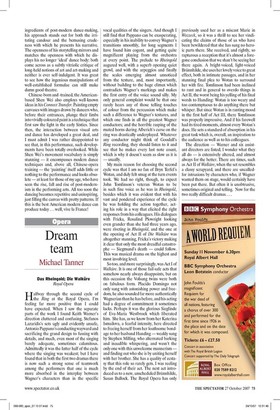Dream team
Michael Tanner Das Rheingold; Die Walkiire Royal Opera Halfway through the second cycle of the Ring at the Royal Opera, I'm feeling far more positive than I could have expected. When I saw the separate parts of the work I found Keith Warner's direction cluttered and confusing, Stefanos Lazaridis's sets ugly and evidently unsafe, Antonio Pappano's conducting wayward and sacrificing the grand design to fussing with details, and much, even most of the singing barely adequate, sometimes calamitous. Admittedly it was the latter half of the cycle where the singing was weakest; but I have found that in both the first two dramas there is now such a strong sense of teamwork among the performers that one is much more absorbed in the interplay between Wagner's characters than in the specific vocal qualities of the singers. And though I still find that Pappano can be exasperating, especially in his inability to convey Wagner's transitions smoothly, for long segments I have found him cogent, and getting quite magnificent playing from the orchestra at every point. The prelude to Rheingold augured well, with a superb opening quiet growl, and with the arpeggios and finally the scales emerging almost unnoticed from the texture, and, most importantly, without building to the huge climax which contradicts Wagner's markings and makes the first entry of the voice sound silly. My only general complaint would be that one rarely hears any of those telling touches of colour from the percussion which make such a difference to Wagner's textures, and which one finds in all the greatest Wagner conductors; and the horrible rasping of the muted horns during Alberich's curse on the ring was drastically underplayed. Whatever any conductor might think of Goodall's Ring recording, they should listen to it and see that he makes every last note count, which is why it doesn't seem as slow as it is — usually.
My main reason for choosing the second cycle was that I am no fan of Bryn Terfel's Wotan, and duly felt smug at the turn events took. We had no right, though, to expect John Tomlinson's veteran Wotan to be in such fine voice as he was in Rheingold, besides which it was evident that with his vast and pondered experience of the cycle he was holding the action together, acting his role in a way that elicited the right responses from his colleagues. His dialogues with Fricka, Rosalind Plowright looking even grander than she had three years ago, were riveting in Rheingold, and the one at the opening of Act II of Die Walkiire was altogether stunning, Fricka's victory making it clear that only the most dreadful catastrophe — Siegmund's death — could follow. This was musical drama on the highest and most involving level.
So too, and more surprisingly, was Act I of Walkiire. It is one of those fail-safe acts that somehow nearly always disappoints, but on this occasion the Volsung twins were both on fabulous form. Placido Domingo not only sung with astonishing power and freedom, he also sounded far more authentically Wagnerian than he has before, and his acting had a degree of commitment it sometimes lacks. Perhaps it was the glorious Sieglinde of Eva-Maria Westbroek which liberated him She has, as we know from her Katerina Ismailova, a fearful intensity, here directed to freeing herself from her loathsome bondage to her husband Hunding — weakly sung by Stephen Milling, who alternated barking and inaudible whispering, and wasn't the only one with this unwelcome mannerism — and finding out who she is by uniting herself with her brother. She has a quality of ecstasy that this role so rarely gets. I was reeling by the end of their act. The next act introduced us to a new, unscheduled Brunnhilde, Susan Bullock. The Royal Opera has only previously used her as a miscast Marie in Wozzeck, so it was a thrill to see her vindicating the claims of those of us who have been bewildered that she has sung no heroic parts there. She received, and rightly, so rapturous a reception that it's almost a foregone conclusion that we shan't be seeing her there again. A bright-voiced, light-voiced Brannhilde, she uses her lovely voice to great effect, both in intimate passages, and in her stunning final plea to Wotan to surround her with fire. Tomlinson had been inclined to rant and in general to overdo things in Act II, the worst being his yelling of his final words to Hunding: Wotan is too weary and too contemptuous to do anything there but whisper. But since Wotan is in ranting mood in the first half of Act III, there Tomlinson was properly impressive. And if his farewell had its tired moments, almost every Wotan's does. He sets a standard of absorption in his great task which is, overall, an inspiration to the audience as well as to his colleagues.
The direction — Warner and six assistant directors are listed; I wonder what they all do — is extensively altered, and almost always for the better. There are times, such as Act II of Walkiire, when the set resembles a classy scrapyard, and there are uncalledfor intrusions by characters who, if Wagner wanted them on stage, would certainly have been put there. But often it is unobtrusive, sometimes original and telling. Now for the two really difficult dramas....


































































 Previous page
Previous page